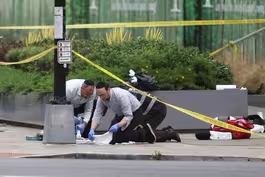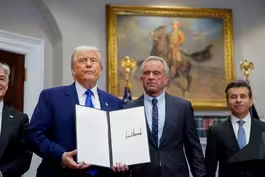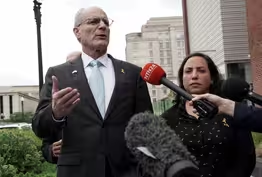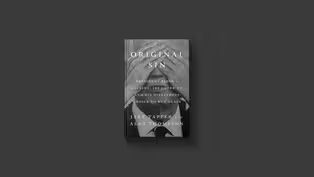
Georgetown scholar speaks for first time since ICE detention
Clip: 5/22/2025 | 9m 33sVideo has Closed Captions
Georgetown scholar and wife speak out for first time since his ICE detention
In their first broadcast interview since his release from ICE detention, Georgetown scholar Badar Khan Suri and his wife, Mapheze Saleh, spoke to Laura Barrón-López about Khan Suri's recent release after nearly two months in a detention facility in Texas. The Trump administration accused Khan Suri of "spreading Hamas propaganda and promoting antisemitism on social media"-- an accusation he denies.
Problems playing video? | Closed Captioning Feedback
Problems playing video? | Closed Captioning Feedback
Major corporate funding for the PBS News Hour is provided by BDO, BNSF, Consumer Cellular, American Cruise Lines, and Raymond James. Funding for the PBS NewsHour Weekend is provided by...

Georgetown scholar speaks for first time since ICE detention
Clip: 5/22/2025 | 9m 33sVideo has Closed Captions
In their first broadcast interview since his release from ICE detention, Georgetown scholar Badar Khan Suri and his wife, Mapheze Saleh, spoke to Laura Barrón-López about Khan Suri's recent release after nearly two months in a detention facility in Texas. The Trump administration accused Khan Suri of "spreading Hamas propaganda and promoting antisemitism on social media"-- an accusation he denies.
Problems playing video? | Closed Captioning Feedback
How to Watch PBS News Hour
PBS News Hour is available to stream on pbs.org and the free PBS App, available on iPhone, Apple TV, Android TV, Android smartphones, Amazon Fire TV, Amazon Fire Tablet, Roku, Samsung Smart TV, and Vizio.
Providing Support for PBS.org
Learn Moreabout PBS online sponsorshipAMNA NAWAZ: As part of President Trump's immigration agenda in his second term, his administration has focused on arresting and detaining foreign students and academics for speaking out against the war in Gaza and raising an alarm about freedom of speech in the process.
In the case of Badar Khan Suri, an Indian national and scholar at Georgetown University, the threat of deportation became a reality.
Laura Barron-Lopez brings us this exclusive.
LAURA BARRON-LOPEZ: Badar Khan Suri was detained for nearly two months in an immigration detention facility in Texas.
The government claims that his social media posts and alleged ties to Hamas are a threat to foreign policy.
But, earlier this month, the federal judge said his detention violated his First Amendment rights and ordered his immediate release.
I'm joined now by Badar and his wife, Mapheze Saleh, who are speaking out for the first time since his release.
Welcome to the "News Hour."
Thank you both so much for being here.
DR. BADAR KHAN SURI, Formerly Detained Georgetown Researcher: Thank you for having us here, yes.
MAPHEZE SALEH, Wife of Dr. Badar Khan Suri: Thank you for having us.
LAURA BARRON-LOPEZ: Badar, you were detained for nearly two months.
Tell me about that experience.
DR. BADAR KHAN SURI: I was teaching my class that day.
And when I reached my home, I saw an unmarked car driving dangerously, was about to hit me.
And then, when I was about to reach my door, it just blocked me.
And this guy with the mask -- he was masked and he jumped out of the car as if he was some militia and asked me, am I Badar?
I said yes.
And next thing he said was, I was under arrest.
I was devastated.
I was terrified.
I said, who is this guy who is just masked and how is he saying that I'm under arrest?
I was terrified.
I was in fear, yes.
LAURA BARRON-LOPEZ: And you were detained in a facility in Virginia, then Louisiana and then finally in Texas.
And some of those transfers happened in the middle of the night, allegedly because of overcrowding in the Virginia facility.
What was going through your mind when all of this was happening?
DR. BADAR KHAN SURI: So, because they didn't show any document that why they are arresting me, they didn't let me talk to my attorneys for seven, eight days until I reached Texas, they didn't let me talk to my wife -- they just kidnapped me and disappeared me and was pushing me from one detention center to other, and in chain -- my hands, my waist, my body was chained, shackled, and treating me an animal, dehumanizing me in every possible way.
I was feeling humiliated.
And, ultimately, when I reached Texas, it was a very, extremely overcrowded place.
I was really terrified.
LAURA BARRON-LOPEZ: Mapheze, as Badar said, he was arrested outside of your home.
What was the first night after he was arrested?
MAPHEZE SALEH: So my older son was asking me when my father will come back.
Then I have to delay telling him the truth.
And I said that your father have something to do, so he traveled.
So that night was a terrifying night for me.
I remember, myself, I slept behind the door.
I was afraid that someone will come and pick up my children and take them away from me, like they did for Badar.
So it was terrifying.
I was crying because the cease-fire ends in Gaza and the war started again.
I was trying to reach my family in Gaza, and I couldn't for some time.
Then, when I talked with my mother, her voice was breaking, and then she was crying.
I was crying for many reasons, crying about my husband and the people who are -- who have been killed in Gaza and the uncertainty.
LAURA BARRON-LOPEZ: So you didn't know where your husband was and you had trouble reaching family in Gaza as well?
MAPHEZE SALEH: Yes, yes.
LAURA BARRON-LOPEZ: And can you describe what it was when Badar was finally released and was able to return home?
MAPHEZE SALEH: The moment I saw him, the soul returned to my body.
And that moment -- it wasn't the moment for me.
It is the moment for hundreds of supporter who was with me that moment.
They were chanting on his name, "One, two, three, Badar is free."
They share with us this joy.
I was proud to be his wife and the mother of his children.
LAURA BARRON-LOPEZ: Badar, the Trump administration accuses you of promoting antisemitism on social media and spreading Hamas propaganda.
Much of this stems from your father-in-law's work as an adviser to a former Hamas leader, Ismail Haniyeh.
Secretary of State Marco Rubio has said that your presence in the U.S. would have -- quote -- "serious adverse foreign policy consequences."
What's your response to these accusations?
DR. BADAR KHAN SURI: So these allegations, I should call them speculations or whatever, because, in the court of -- in the court in front of the judge, they were not able to bring any shred of any evidence, any proof, anything.
The honorable judge kept on asking, whatever you guys are talking in social media, bring something here.
Nobody brought anything.
LAURA BARRON-LOPEZ: Did you attend any protests in your time at Georgetown?
DR. BADAR KHAN SURI: Never, ever.
I was extremely busy in my research, and my research is not on Palestine.
It is on South Asia.
So I was never able to join any protests, anything.
I didn't have the time.
LAURA BARRON-LOPEZ: You were detained, the federal judge said, essentially, for your speech.
At the same time, the administration's is cracking down on universities, like Columbia, universities, but others.
And, last night, a couple was murdered outside the Jewish museum in Washington after an event for aid to Gaza allegedly by a man chanting "Free Palestine."
How are you thinking about this larger moment in America?
DR. BADAR KHAN SURI: The last thing, about the murder of the Jewish couple, when I heard about that, I was devastated.
It was horrifying.
I was shocked.
It was like a personal pain for me.
Anyone dying out of such violence, out of -- this is terrorism, nothing else.
I want to hug the family which is going through all these things.
As I come from India and Mahatma Gandhi's ideology guide me, violence is not the solution for anything.
Any cause you are carrying, if you commit a violence, that is crime.
On the first questions which you asked about these protests and these deportations, so I would say this.
If they are targeting them for just talking, just having their free speech, which is protected under the Constitution, then it is unconstitutional by government.
If they are just picking these young kids and trying to deport them, then it is violating the due process right, which is -- which, again, becomes unconstitutional and is contempt to the Constitution.
So I see it that.
LAURA BARRON-LOPEZ: Badar, your deportation proceedings are still ongoing.
Why did you decide, with those still ongoing, to speak out?
DR. BADAR KHAN SURI: One should at this time show courage, because courage is also contagious.
This chilling effect of fear should end.
One should need to show courage.
I am a professor.
I am an academician.
It is my duty to talk about any conflict happening.
LAURA BARRON-LOPEZ: Mapheze, you are an American citizen.
Why did you decide to speak out?
And have you thought about what would happen if your husband is deported?
MAPHEZE SALEH: I am a Palestinian who feel the pain of my people in Gaza.
And I am also American who believe the freedom of speech which this country promised me and owes me and owes everyone here.
If anyone seeing 53,000 Palestinians killed and he will be silent, then it is something weird.
They should be ashamed of themselves to put an innocent person in jail.
They should be ashamed of themselves to separate a father from his three children.
I am a Palestinian, and this is my duty to talk about my people.
They will not silence our voice.
They will not break our spirit.
If now they are targeting everyone who dare to speak about Palestine and dare to speak against the ongoing genocide in Gaza, then who is next?
LAURA BARRON-LOPEZ: You moved to the United States in 2022.
Do you still think that America is a place that students, researchers can and should still come to?
DR. BADAR KHAN SURI: The people here are the best.
This is a society built on immigration.
This is a society which has the best -- which will take care of your potential.
This is a society, this is a country which will make you a better human being, because this country has everything to offer.
So they should come.
They should be courageous.
LAURA BARRON-LOPEZ: Badar Khan Suri and Mapheze Saleh, thank you for joining us and sharing your story.
DR. BADAR KHAN SURI: Thank you very much.
Israeli embassy killings investigated as terrorism
Video has Closed Captions
Clip: 5/22/2025 | 3m 34s | Israeli embassy worker killings investigated as hate crime and terrorism (3m 34s)
‘MAHA’ report targets vaccines, food and prescription drugs
Video has Closed Captions
Clip: 5/22/2025 | 8m 49s | Kennedy's ‘MAHA’ report targets vaccines, food supply and prescription drugs (8m 49s)
'Stop delegitimizing us,' Israeli ambassador to U.S. says
Video has Closed Captions
Clip: 5/22/2025 | 7m 11s | 'Stop delegitimizing us,' Israeli ambassador to U.S. says after embassy worker killings (7m 11s)
Tapper and Thompson discuss book on Biden's signs of decline
Video has Closed Captions
Clip: 5/22/2025 | 9m 54s | Tapper and Thompson discuss book claiming Biden's inner circle hid signs of decline (9m 54s)
Trump's bill clears House, faces uncertain future in Senate
Video has Closed Captions
Clip: 5/22/2025 | 6m 29s | House GOP passes Trump's 'big, beautiful bill,' but it faces uncertain future in Senate (6m 29s)
Providing Support for PBS.org
Learn Moreabout PBS online sponsorship
- News and Public Affairs

FRONTLINE is investigative journalism that questions, explains and changes our world.

- News and Public Affairs

Amanpour and Company features conversations with leaders and decision makers.












Support for PBS provided by:
Major corporate funding for the PBS News Hour is provided by BDO, BNSF, Consumer Cellular, American Cruise Lines, and Raymond James. Funding for the PBS NewsHour Weekend is provided by...




